The Year of Reading Proust discussion

This topic is about
Time Regained
Time Regained, vol. 7
>
Through Sunday, 24 Nov.: Time Regained
 I have also been amused by the imitation or pastiche of the "chroniqueurs" of fashion and how the "couturiers" have substituted the artists...
I have also been amused by the imitation or pastiche of the "chroniqueurs" of fashion and how the "couturiers" have substituted the artists...Ainsi faisaient en 1916 les couturiers qui d'ailleurs avec une orgueilleuse conscience d'artistes avouaient que "chercher du nouveau s'écarter de la banalité, affirmer une personnalité, préparer la victoire, dégager pour les générations d'après la guerre une formule nouvelle de beau.... p 96.
 And now the Verdurins and Andrée turn away from Modernism and from the Ballets Russes...
And now the Verdurins and Andrée turn away from Modernism and from the Ballets Russes...This is Andrée, who has married Octave (Cocteau -- who had worked with the Ballets Russes in the Ballet "Parade"), and speaking of the Marquis de Polignac
Il a sa maison décorée par Bakst; comment peut-on dormir là dedans ! J'aimerais mieux Dubuffe. p. 105.
I had a hard time finding about this Dubuffe, because Proust seems to have misspelt it with two Fs.
Karpeles has not included anything about this, but I think Andrée is referring to Claude-Marie Dubufe (1790-1864), a French portraitist, often depicting nobility, or to any one of his descendants, also painters... His son Edouard-Louis Dubufe (1819-1883) and grandson Guillaume Dubufe (1853-1909) . I think the grandfather and grandson are the most famous.
Sample from the Dubufe grandfather
Portrait of Louise de Montmorency (!).

Below the Princesse Louise d'Orléans

Sample from the Dubufe grandson (Guillaume).
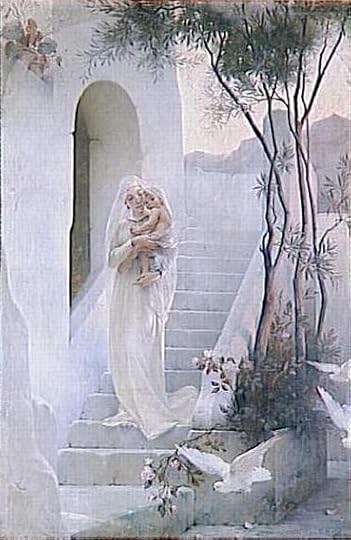
And the Dubufe family..., by Claude-Marie.
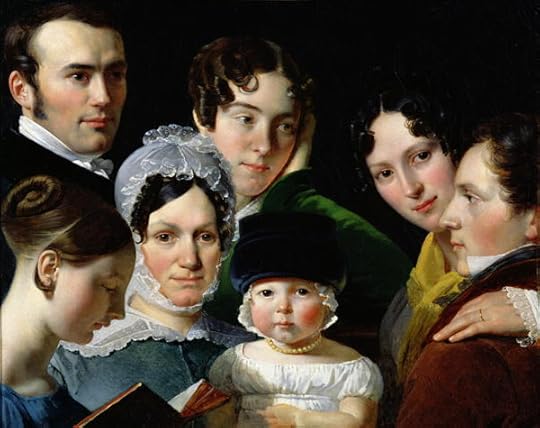
 Kalliope wrote:
Kalliope wrote: And the Dubufe family..., by Claude-Marie.
This painting is remarkable. They really do look like family. They all look alike!
 The impact of Le Sacre du printemps
The impact of Le Sacre du printemps"All the excitement [of Igor Stravinsky's early career] was nothing against the impact of Le Sacre du printemps, which had its premiere on May 29, 1913 [when he was thirty]. Stravinsky had conceived the idea for it while working on Firebird. 'I dreamed of a scene of pagan ritual in which a chosen sacrificial virgin danced herself to death.' Work on Le Sacre was dropped for Petrushka, but Stravinsky soon resumed work on the new ballet. (He has said that The Coronation of Spring would be closer to his original meaning than the usual translation, The Rite of Spring.) Vaslav Nijinsky was the choreographer, and the premiere resulted in the most famous scandale in the history of music. Hardly anybody in the audience was prepared for a score of such dissonance and ferocity, such complexity and such rhythmic oddity.
"Nobody connected with the production had the faintest idea that the music would provoke a visceral reaction. As soon as the bassoon ended its phrase in the high register, at the very opening of the ballet, laughter broke out. Soon there were whistles and catcalls. Nobody could hear the music. Diaghilev had the electricians switch the house lights off and on, in an effort to restore order. Nijinsky, in the wings, yelled the rhythms to the dancers. The Comtesse de Pourtales stood in her box, brandishing her fan, and shouted: 'This is the first time in sixty years that anybody has dared make fun of me.' People hurled insults at each other. The Apaches, [a musical school of thought] headed by Ravel, shrieked their praise. Stravinsky himself, in his Expositions and Developments, has described the famous evening at the Theatre des Champs-Elysees:
"Mild protests against the music could be heard from the very beginning of the performance. Then, when the curtain opened ... the storm broke. Cries of 'Ta gueule' (shut up!) came from behind me. I heard Florent Schmitt shout 'Taisez-vouz garces du seizieme' (be quiet, bitches of the sixteenth!); the 'garces' of the sixteenth arondissement were, of course, the most elegant ladies in Paris. The uproar continued, however, and a few minutes later I left the hall in a rage; I was sitting on the right near the orchestra, and I remember slamming the door. I have never again been that angry. The music was familiar to me; I loved it, and I could not understand why people who had not yet heard it wanted to protest in advance. I arrived in a fury backstage, where I saw Diaghilev flicking the house lights in a last effort to quiet the hall. For the rest of the performance I stood in the wings behind Nijinsky holding the tails of his frac while he stood on a chair shouting numbers to the dancers like a coxswain." ...
Author: Harold C. Schonberg
Title: The Lives of the Great Composers
Pages: 480, 486
From Delancyplace: http://campaign.r20.constantcontact.c...
 Kalliope: Goncourt Bros. Well, yes. Proust led me to read them, as well as Mme. de Sevigne and Saint-Simon.
Kalliope: Goncourt Bros. Well, yes. Proust led me to read them, as well as Mme. de Sevigne and Saint-Simon.
 Kalliope again: re Mme Tallien or Thérèse Tallien: nope; don't know a thing; don't faint!
Kalliope again: re Mme Tallien or Thérèse Tallien: nope; don't know a thing; don't faint!Story about endless rewrites. Sonja Tolstoy once told one of her sons that, by her estimation, she had (hand) written War and Peace at least 8 times. Every morning Tolstoy would give her several sheaves of writing, all scribbled and full of carets; she (after putting the children to bed) would carefully go over it (she was one of the few people who cld decipher his handwriting), and give it to him. The next day she wld receive it, totally rewritten, notes in margins, paragraphs crossed out, new ones added, etc.
 And on this thread, too, I must remark how offended I am that--was it Patricia?--mis-interpreted my "liason" with the college prof; from what she said she seemed to imagine that I was having an affair with him in front of my students! The University that sponsored this program (by which the students paid tuition and got college credits in the core subjects they took) always had a prof who was my liason, WHICH MEANS he read my syllabus, gave me advice, and visited my class one or twice a semester. Jeez.
And on this thread, too, I must remark how offended I am that--was it Patricia?--mis-interpreted my "liason" with the college prof; from what she said she seemed to imagine that I was having an affair with him in front of my students! The University that sponsored this program (by which the students paid tuition and got college credits in the core subjects they took) always had a prof who was my liason, WHICH MEANS he read my syllabus, gave me advice, and visited my class one or twice a semester. Jeez.
 Re the Goncourt pastiche:
Re the Goncourt pastiche:I too found the switch of pace a little brutal compared to Proust's style but after a while the reader in the audio version helped me enjoy the pastiche.
In 1922 Proust published an article in Le Gaulois entitled "Les Goncourt devant leurs cadets" (Le Gaulois, 27 May 1922) where Proust was asked how he viewed the Goncourts' legacy: in essence he said that Edmond de Goncourt was too attached to writing down all the details and anecdotes to become a great writer who would have used these anecdotes towards creating something new:
"Cette subordination de tous les devoirs mondains, affectueux, familiaux, au devoir d'être le serviteur du vrai, aurait pu faire la grandeur de M. de Goncourt, s'il avait pris le mot de vrai dans un sense plus profond et plus large, s'il avait créé plus d'êtres vivants dans la description desquels le carnet du croquis oublié de la mémoire vous apporte sans qu'on le veuille un trait différent, extensif et complémentaire. Malheureusement, au lieu de cela, il observait, prenait des notes, rédigeait un journal, ce qui n'est pas d'un grand artiste, d'un créateur. Ce journal malgré tout, si calomnié, reste un livre délicieux et divertissant."
and
"... ce noble artiste, cet historien de la valeur la plus haute et la plus neuve, ce véritable romancier impressionniste si méconnu, était aussi un homme d'une naïveté, d'une crédulité, d'une bonhommie inquiète et délicieuse."
The full article is in Ecrits Sur L'Art (page 366-368).
Some analysis of Proust's view of the Goncourts' book:
http://books.google.fr/books?id=9Ivqj...
 On Trench art as the new fashion in the salons:
On Trench art as the new fashion in the salons:Continuing from the passage previously quoted by Kalliope:
... bijoux évoquant les armées par leur thème décoratif, si même leur matière ne venait pas des armées, n'avait pas été travaillée aux armées; au lieu d'ornements égyptiens rappelant la campagne d'Égypte, c'étaient des bagues ou des bracelets faits avec des fragments d'obus ou des ceintures de 75, des allume-cigarettes composés de deux sous anglais, auxquels un militaire était arrivé à donner, dans sa cagna, une patine si belle que le profil de la reine Victoria y avait l'air tracé par Pisanello... p96
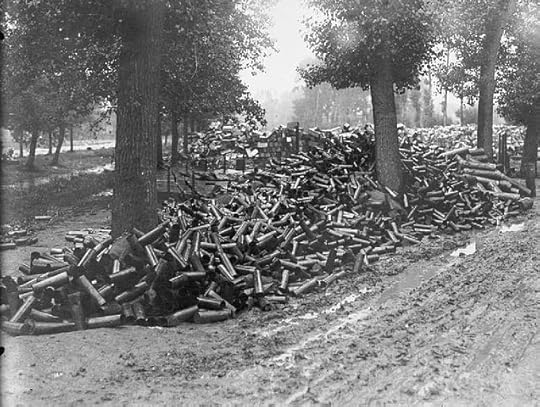
Huge amounts of shell cases piled in the trenches
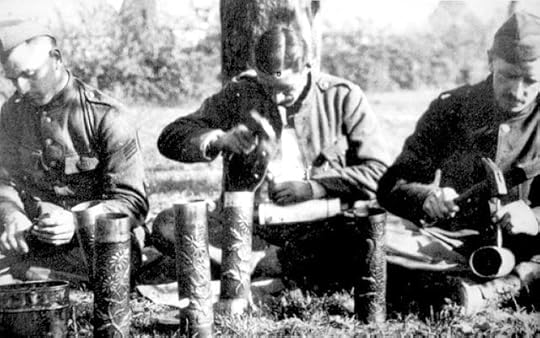
Belgian soldiers crafting things from the empty shells
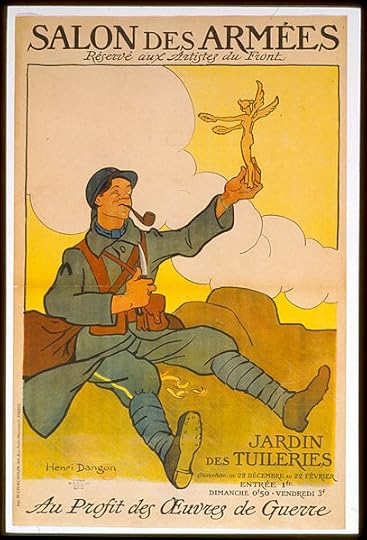
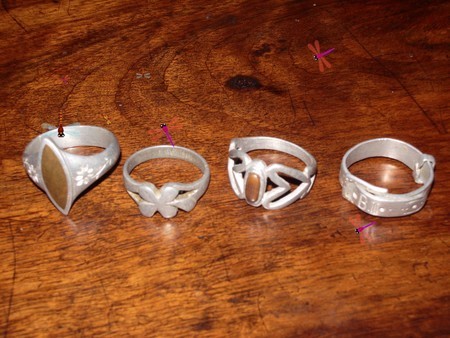
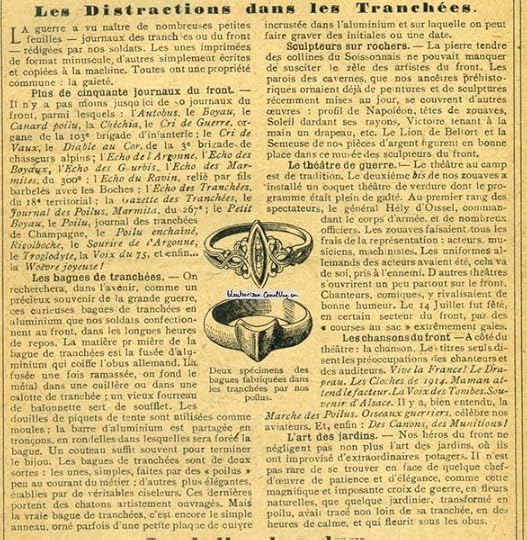
http://p3.storage.canalblog.com/33/09...
http://en.wikipedia.org/wiki/Trench_art
http://fr.wikipedia.org/wiki/Artisana...
And for (many) more pictures: http://bleuhorizon.canalblog.com/arch...
The reference to Pisanello is picked up on by Karpeles (I don't remember the exact painting he showed; this one is from the Louvre collection):
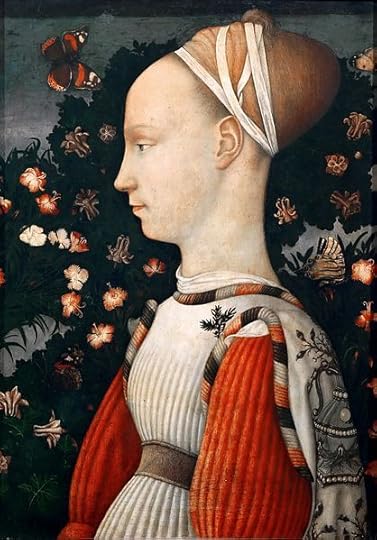
 Elizabeth wrote: "And on this thread, too, I must remark how offended I am that--was it Patricia?--mis-interpreted my "liason" with the college prof; from what she said she seemed to imagine that I was having an aff..."
Elizabeth wrote: "And on this thread, too, I must remark how offended I am that--was it Patricia?--mis-interpreted my "liason" with the college prof; from what she said she seemed to imagine that I was having an aff..."Elizabeth, I'm so sorry that you were hurt by Patricia's remark. I know that she was just trying to be funny. Because you came in late, you perhaps missed our fun- loving, crazy Proust reading housewife of Argentina who is a real character and an absolute delight. I know she would feel crushed to know that she hurt your feelings. I've written to her, and I'm sure she will come in to make things right. I just don't know how often she signs in to Goodreads.
 Kalliope wrote: "These days I am reading
Kalliope wrote: "These days I am reading  , which is a fun read... Anyway, the author talks about the discoveries and excavations at Tell-el-Amarna during 1913 ..."
, which is a fun read... Anyway, the author talks about the discoveries and excavations at Tell-el-Amarna during 1913 ..."I missed all about the cylinder-hat rage in Paris during the 1914-1916! I'm picturing Charlus in his "tube" inspired by Nefertiti's headdress. I think he'd have secretly loved that! :)
I'm not sure but I think when Proust talks about "la campagne d'Egypte" he might be referring to Napoleon's time. A military campaign that led to the discovery of the Rosetta Stone and significantly influenced the fashion & decorative arts during Napoleon's reign ("le style empire") and experienced periodical revivals afterwards. But there's no doubt that the new findings in Egypt in the early XX century led to a real Egyptomania. :)
http://en.wikipedia.org/wiki/French_c...
http://en.wikipedia.org/wiki/Empire_s...
 Elizabeth wrote: "And on this thread, too, I must remark how offended I am that--was it Patricia?--mis-interpreted my "liason" with the college prof; from what she said she seemed to imagine that I was having an aff..."
Elizabeth wrote: "And on this thread, too, I must remark how offended I am that--was it Patricia?--mis-interpreted my "liason" with the college prof; from what she said she seemed to imagine that I was having an aff..."Elizabeth, it is clear that this has been an issue of dealing with a foreign language.
I have been through so many language misunderstandings... Often these are created precisely to those who are well read because they read texts from various periods and learn vocabulary that has changed meaning through time. Something of the sort happened to me with the word "intercourse", used in earlier English in the sense of "conversation" but with a much more limited meaning in modern English.. No need to tell the rest of the story, I guess.
 ReemK10 (Paper Pills) wrote: "Kalliope wrote:
ReemK10 (Paper Pills) wrote: "Kalliope wrote: And the Dubufe family..., by Claude-Marie.
This painting is remarkable. They really do look like family. They all look alike!"
Yes, the group portrait is wonderful... Such a clever combination of faces in space... You can also tell that the painter knows those portrayed really well... while portraits of nobility were limited to the amount of time the painter really had access to the sitter.
 Book Portrait wrote: "Kalliope wrote: "These days I am reading
Book Portrait wrote: "Kalliope wrote: "These days I am reading  , which is a fun read... Anyway, the author talks about the discoveries and excavations at Tell-el-Am..."
, which is a fun read... Anyway, the author talks about the discoveries and excavations at Tell-el-Am..."Yes, I first thought the Egyptian campaign referred to Napoleon's but then learning what a huge impact the German diggings in Tell-el-Amarna had and how recent it was to Proust's time (who kept very up to date with current affairs), and the fashion for female cylinder hats... made me wonder whether he referred to these newer excavations.
The Napoleon ones were celebrating their centennial in Proust's time.
http://en.wikipedia.org/wiki/Amarna
 Book Portrait wrote: "On Trench art as the new fashion in the salons:
Book Portrait wrote: "On Trench art as the new fashion in the salons:... bijoux évoquant les armées par leur thème décoratif, si même leur matière ne venait ..."
Next year is the centennial of WWI... Many books are already coming out and I am forming my reading list.
 Elizabeth wrote: "Kalliope: Goncourt Bros. Well, yes. Proust led me to read them, as well as Mme. de Sevigne and Saint-Simon."
Elizabeth wrote: "Kalliope: Goncourt Bros. Well, yes. Proust led me to read them, as well as Mme. de Sevigne and Saint-Simon."LOL.. I knew it... I read Mme de Sévigné years ago but would not mind reading her again. Also, I used to live in her street in Paris, just across her mansion (now Musée Carnavalet).. The Goncourts I will leave for later... Soon I want to tackle the 2 vols of the Colette you recommended and I also have a bio on Misia.
 Elizabeth wrote: "Kalliope again: re Mme Tallien or Thérèse Tallien: nope; don't know a thing; don't faint!
Elizabeth wrote: "Kalliope again: re Mme Tallien or Thérèse Tallien: nope; don't know a thing; don't faint!(..."
As we say, all rule needs an exception.
 Kalliope wrote: "Elizabeth wrote: "And on this thread, too, I must remark how offended I am that--was it Patricia?--mis-interpreted my "liason" with the college prof; from what she said she seemed to imagine that I..."
Kalliope wrote: "Elizabeth wrote: "And on this thread, too, I must remark how offended I am that--was it Patricia?--mis-interpreted my "liason" with the college prof; from what she said she seemed to imagine that I..."What would it take to get you to share this story? lol I'm sure that I must have a similar story stashed somewhere in my memory.
 ReemK10 (Paper Pills) wrote: "Kalliope wrote: "Elizabeth wrote: "And on this thread, too, I must remark how offended I am that--was it Patricia?--mis-interpreted my "liason" with the college prof; from what she said she seemed ..."
ReemK10 (Paper Pills) wrote: "Kalliope wrote: "Elizabeth wrote: "And on this thread, too, I must remark how offended I am that--was it Patricia?--mis-interpreted my "liason" with the college prof; from what she said she seemed ..."LOL... I'd rather not intercourse about it...
 Of course, Proust manages to write a very poetic description of Paris, at war, during the night.
Of course, Proust manages to write a very poetic description of Paris, at war, during the night.Gautier-Vignal in his Proust connu et inconnu spoke of how Proust was completely fearless during the war and had no qualms about going out at night and walking around during curfew hours.
 Kalliope wrote: "Of course, Proust manages to write a very poetic description of Paris, at war, during the night.
Kalliope wrote: "Of course, Proust manages to write a very poetic description of Paris, at war, during the night.Gautier-Vignal in his Proust connu et inconnu spoke of how Proust was completely fe..."
Celeste writes about this as well: I don't have the book handy now, but something about him coming home covered in dust or powder, or ... does anyone remember?
 Martin wrote: "
Martin wrote: "Gautier-Vignal in his Proust connu et inconnu spoke of how Proust ..."
I have not read Celeste's yet, but several others here have... May be also Carter talks about it. I have read his excellent bio but a while ago.
 Martin wrote: "Eugene wrote: "But what surprises me most is why isn't ISOLT considered an unfinished novel by the scholars and academics who have devoted their lives and livelihoods to it? Why haven't they specif..."
Martin wrote: "Eugene wrote: "But what surprises me most is why isn't ISOLT considered an unfinished novel by the scholars and academics who have devoted their lives and livelihoods to it? Why haven't they specif..."In an article which Elaine posted in The Lounge yesterday, Who's afraid of MP? the author Patrick Guiness writes, "the law of diminishing returns shows us that real memory is involuntary memory, that to regain time you must wait fot time to regain you. Often -mostly- it does not."
 On birds and airplanes...
On birds and airplanes...Towards the evening the Narrator notices in the sky some brown stains or marks (taches brines) which seem like birds or "moucherons" but which are airplanes..., and this affects him.
Ainsi étais-je ému - que la tache brune dans le ciel d'été ne fut ni un moucheron ni un oiseau, mais un aéroplane monté par des hommes qui viellaient sur Paris. p. 108.
And then he claims that these airplanes remind him of the last promenade on the airplanes he had seen with Albertine in Versailles during their last walk.
Of course, that is so in the novel. But we know how Agostinelli died and that Albertine died when she fell off a horse... So, in this poignant image and reminder the Narrator cannot say why airplanes have such a strong effect on him.
Even though he says that the memory of the Versailles walk had become indifferent to him... Do we truly believe him?
 Kalliope wrote: "I have also been amused by the imitation or pastiche of the "chroniqueurs" of fashion and how the "couturiers" have substituted the artists...
Kalliope wrote: "I have also been amused by the imitation or pastiche of the "chroniqueurs" of fashion and how the "couturiers" have substituted the artists...Ainsi faisaient en 1916 les couturiers qui d'ailleurs..."
And the Narrator does not miss a beat with his editorial comment in () when reporting the words of a chroniqueur. "Ce sera même une des plus heureuses conséquences de cette triste guerre (on attendait: la reprise des provinces perdues, le réveil du sentiment national).. He is so witty.
I have intended to read La Fille aux yeux d'or for a while. It is now on my reading list.
Céleste Albaret does indeed mention Proust's fearlessness during the war, but if my memory serves me well, he also seemed to assume that she was equally fearless, while the poor young woman was terrified. Maybe I am just projecting here!
'Babal, Mémé, Grigri' strike me as so utterly regressive, puerile and undignified in the mouth of those aristocrats who prided themselves on their sophistication. Granted, linguistic affectations have always existed and still do. Under the Directoire, it was chic for ladies to drop the 'r'. C'est meveilleux, c'est fomidable, c'est extaodinèèè! Or nowadays with the rising intonation in declarative sentences. But this 'Fonfons' et al seem so incongruously idiotic, n'est-ce-pas, Fiofio, Lioliope? What do you think, Gegene?
@BP, what happened to your beret? Lost in a blizzard? I like the new headdress though.
 Jocelyne wrote: "Kalliope wrote: "I have also been amused by the imitation or pastiche of the "chroniqueurs" of fashion and how the "couturiers" have substituted the artists...
Jocelyne wrote: "Kalliope wrote: "I have also been amused by the imitation or pastiche of the "chroniqueurs" of fashion and how the "couturiers" have substituted the artists...Ainsi faisaient en 1916 les couturie..."
I loved the Fonfons... I think I shall adopt it.
 Colette has a great story about attending a party with Proust...staying out too late...the blackout was on. No carriages. Proust v. worried; independent Colette took off her shoes and said, "I can easily find my way home barefoot." The country girl from the Loire valley, even after 25 years in Paris...
Colette has a great story about attending a party with Proust...staying out too late...the blackout was on. No carriages. Proust v. worried; independent Colette took off her shoes and said, "I can easily find my way home barefoot." The country girl from the Loire valley, even after 25 years in Paris...
 He mentions the word "socialiste" (in a political sense) for the first time.
He mentions the word "socialiste" (in a political sense) for the first time. After mentioning death or explicit war casualties also for the first time.
Some of the young officers he met in Doncières (may be not so young now by the time they were at the front) se firent tuer à la bataille de la Marne ou ailleurs en trainant leurs hommes p. 118.
And the socialists were also there when he visited Doncières, but then they weren't under his radar since ils ne fréquentaient pas le milieu Saint-Loup. (but of course...!!).
The socialists and the "aristos" and both behaving with similar nationalistic interests.... ce même patriotisme les officiers nobles le rencontrèrent pleinement chez les socialistes. Before the "socialistes" had been accused of being "sans-patrie".
 Elizabeth wrote: "Colette has a great story about attending a party with Proust...staying out too late...the blackout was on. No carriages. Proust v. worried; independent Colette took off her shoes and said, "I can..."
Elizabeth wrote: "Colette has a great story about attending a party with Proust...staying out too late...the blackout was on. No carriages. Proust v. worried; independent Colette took off her shoes and said, "I can..."Weird times... It seems one of the reasons why Proust became an "habitué" of the Ritz during the war was because it was the only place open. He and his friends would meet in a table laid out for them underneath the main staircase and attended by one particular waiter... So, no the Ritz as we would imagine it now...
 Comedy in ISOLT: When a grown man, in failing health, writes a story that involves the antics of Villeparisis, Norpois, Foggi and Sazerat, among other characters I have to think it comedic, but never "hilarious" as some say, but a good, straight-faced humor and this becomes a definition of the writer's wit. Proust, to me, is not a funny writer (when he commonly attempts to be so [as in his pastiches], he fails) but he does write humorously and what we read: the characters, their antics, the coincidence of their appearance, etc. (someone referred to ISOLT as a "soap opera" which I don't agree with because I'd like a 1913 phrase to describe it for now, which I don't have) is comedy.
Comedy in ISOLT: When a grown man, in failing health, writes a story that involves the antics of Villeparisis, Norpois, Foggi and Sazerat, among other characters I have to think it comedic, but never "hilarious" as some say, but a good, straight-faced humor and this becomes a definition of the writer's wit. Proust, to me, is not a funny writer (when he commonly attempts to be so [as in his pastiches], he fails) but he does write humorously and what we read: the characters, their antics, the coincidence of their appearance, etc. (someone referred to ISOLT as a "soap opera" which I don't agree with because I'd like a 1913 phrase to describe it for now, which I don't have) is comedy. Question yourselves: is this tragedy like Racine, or documentary realism like Zola, or melancholy naturalism like Flaubert, etc.? What is it, if not comedy? Especially the parts that don't try to be commonly 'funny', like the meditation on writing that followed the pastiche.
I realized today, after over 4000 pages, that I was laughing with Proust.
 "—Dresden plates daintier and of more graceful workmanship, with drowsy, bloodless roses fading into violet, with ragged-edged tulips the color of wine-lees, with the rococo elegance of a pink or a forget-me-not—Sevres plates meshed with the close guilloche of their white fluting, whorled in gold, or knotted with a golden ribbon that stands in gallant relief upon the creamy smoothness of the paste—" ML p. 30
"—Dresden plates daintier and of more graceful workmanship, with drowsy, bloodless roses fading into violet, with ragged-edged tulips the color of wine-lees, with the rococo elegance of a pink or a forget-me-not—Sevres plates meshed with the close guilloche of their white fluting, whorled in gold, or knotted with a golden ribbon that stands in gallant relief upon the creamy smoothness of the paste—" ML p. 30Contrasting the floral and very pretty passage above from the Goncourt pastiche which observes much but is also lifeless with the alive prose below that is of a human observer, although unnamed or unmentioned, and is floral and pretty too. But what a difference, M Proust! Merci.
But by a refinement of exquisite delicacy the meadow upon which were displayed these shadows of trees, light as souls, was a meadow of paradise, not green but of a whiteness so dazzling because of the moonlight shining upon the jade-like snow that it might have been a meadow woven entirely from petals of flowering pear trees. ML p. 66
 I have been looking for paintings by Raphaël which would show trees because I loved the way Proust wrote about the night in Paris during the war and after all the lights had to be turned off. The light is coming from the "clair de lune" which he loves and which is mentioned twice in a single page. He pays attention to the silhouettes of the trees and compares them to the Italian painter's.
I have been looking for paintings by Raphaël which would show trees because I loved the way Proust wrote about the night in Paris during the war and after all the lights had to be turned off. The light is coming from the "clair de lune" which he loves and which is mentioned twice in a single page. He pays attention to the silhouettes of the trees and compares them to the Italian painter's.It is not easy to find many of these images because in Renaissance art landscapes are to be found in backgrounds and that is something that the Northern painter included more often than did the Southern one.
Les silhouettes des arbres se reflétaient nettes et pures sur cette neige d'or bleuté, avec la délicatesse qu'elles ont dans certaines peintures japonaises ou dans certains fonds de Raphaël. p. 110.
And here are a couple of samples of dainty trees.

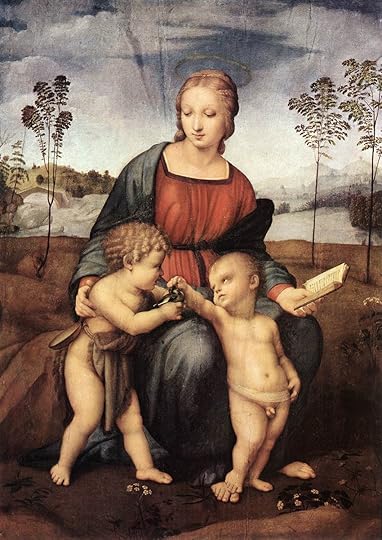
 Jocelyne wrote: "Kalliope wrote: "I have also been amused by the imitation or pastiche of the "chroniqueurs" of fashion and how the "couturiers" have substituted the artists...
Jocelyne wrote: "Kalliope wrote: "I have also been amused by the imitation or pastiche of the "chroniqueurs" of fashion and how the "couturiers" have substituted the artists...Ainsi faisaient en 1916 les couturie..."
Jocelyne, I hope to read Céleste's book soon but I have the film "Céleste" (German production) and she certainly comes across as a very devoted and patient woman. G-V also tells us how when Proust no longer wanted to have a phone at home, would send her to the street to call from a public phone whenever he wanted to pass on a message to anyone....
The film also shows her horrified by some of the stories he would tell her of the cruel things that were done in some places.
Lots of patience...
 The Narrator addresses the reader again a couple of times in this section, and draws attention to the fact that he is engaged in writing a piece of work.
The Narrator addresses the reader again a couple of times in this section, and draws attention to the fact that he is engaged in writing a piece of work. Je songeais que je n'avais pas revu depuis bien longtemps aucune des personnes dont il a été question dans cet ouvrage.p. 111.
By so doing he is proving that in effect he has had no difficulty with his powers of observation but that these have been focused on something different than what the Goncourts would have selected. So his declaration of intentions is embedded in the proof that those intentions have been achieved.
 And I could not fail to be delighted by the criticism he makes of the conventional concept of "virilité" (in fact, it is in this passage that he addresses the "lecteur"), because he sees in it falsity, a "mensonge". And "mensonges" or lies are for him interesting because they are misrepresentations. And as Proust's aim is to represent truth, anything or any occasion that gives rise to this "mensonge", whether these are straight lies (Albertine's and which made it impossible for him and for us to know what Albertine was like) or fake social and/or artistic conventions, to him are part of these counterfeits that he likes to unmask.
And I could not fail to be delighted by the criticism he makes of the conventional concept of "virilité" (in fact, it is in this passage that he addresses the "lecteur"), because he sees in it falsity, a "mensonge". And "mensonges" or lies are for him interesting because they are misrepresentations. And as Proust's aim is to represent truth, anything or any occasion that gives rise to this "mensonge", whether these are straight lies (Albertine's and which made it impossible for him and for us to know what Albertine was like) or fake social and/or artistic conventions, to him are part of these counterfeits that he likes to unmask.So his criticism of "virilité" as this concept that prevents some men, including writers, to show their true feelings is being analyzed and mocked.
Inevitably, I laughed out loud at:
Allons tonnerre de Dieu bougre d'idiot embrasse-moi donc et prends donc cette bourse qui me gêne, espèce d'imbécile.. p. 120.
 Jocelyne wrote: "Kalliope wrote: "I have also been amused by the imitation or pastiche of the "chroniqueurs" of fashion and how the "couturiers" have substituted the artists...
Jocelyne wrote: "Kalliope wrote: "I have also been amused by the imitation or pastiche of the "chroniqueurs" of fashion and how the "couturiers" have substituted the artists...Ainsi faisaient en 1916 les couturie..."
Jocelyne,
I have found this on Céleste.. You can see her and listen to her directly. It is wonderful.
http://fresques.ina.fr/jalons/fiche-m...
It is an old TV program showing her being interviewed and it includes a transcription of her answers...
She tells us how Proust would tell her about the people he had met when he went out and what he had been thinking about those personalities. He also would make fun and laugh at his characters and tell her "how will this one manage to refind himself" ?.
 We should not be surprised that he also paid so much attention to the language of stock-brokers...
We should not be surprised that he also paid so much attention to the language of stock-brokers..... se produisait une hausse sur la DeBeers, ou des "offres" sur l'Extérieure, si le marché de la première était "ferme" et "actif", celui de la seconde "hésitant", "faible" et qu'on s'y tînt "sur la réserve"...
And images like Dégas' come to mind...
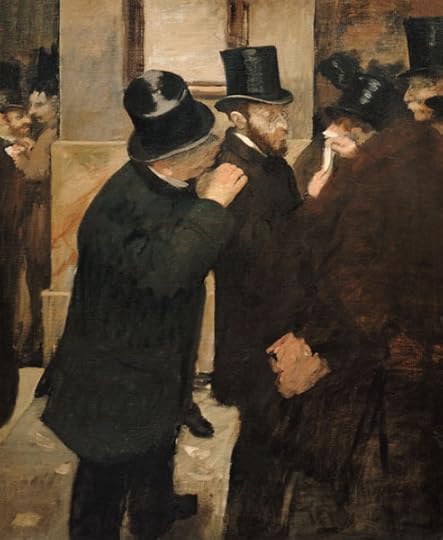
 Jocelyne wrote: "Under the Directoire, it was chic for ladies to drop the 'r'. C'est meveilleux, c'est fomidable, c'est extaodinèèè! Or nowadays with the rising intonation in declarative sentences. But this 'Fonfons' et al seem so incongruously idiotic, n'est-ce-pas, Fiofio, Lioliope? What do you think, Gegene?"
Jocelyne wrote: "Under the Directoire, it was chic for ladies to drop the 'r'. C'est meveilleux, c'est fomidable, c'est extaodinèèè! Or nowadays with the rising intonation in declarative sentences. But this 'Fonfons' et al seem so incongruously idiotic, n'est-ce-pas, Fiofio, Lioliope? What do you think, Gegene?"ROFL. Oh my god, please no!! :DD
{ROFL stands for Rolling On the Floor Laughing... which under the Directoire would come out as "OFL"...}
 Kalliope: "Saint-Loup used to take cocaine while in Tansonville. p. 119." Freud took it, too; its dangers (much like tobacco) took a long time to be recognized. Once, in the 80s, I was watching the news with my mother (who graduated from Nurses' Training School in 1931). One of the surgeons she worked for was an ophthalmologist. They had a news article about cocaine. She turned to me: "Elizabeth, is cocaine a dangerous drug?" "Sure, mom, it's addictive and has terrible side effects." "For goodness' sake," she said; "we used to pack patients' noses with it, for eye surgeries." And I had an unrepentedly hilarious image of some one saying, "Gimme MORE eye surgery! I want MORE!"
Kalliope: "Saint-Loup used to take cocaine while in Tansonville. p. 119." Freud took it, too; its dangers (much like tobacco) took a long time to be recognized. Once, in the 80s, I was watching the news with my mother (who graduated from Nurses' Training School in 1931). One of the surgeons she worked for was an ophthalmologist. They had a news article about cocaine. She turned to me: "Elizabeth, is cocaine a dangerous drug?" "Sure, mom, it's addictive and has terrible side effects." "For goodness' sake," she said; "we used to pack patients' noses with it, for eye surgeries." And I had an unrepentedly hilarious image of some one saying, "Gimme MORE eye surgery! I want MORE!"
 Eugene wrote: "Comedy in ISOLT: When a grown man, in failing health, writes a story that involves the antics of Villeparisis, Norpois, Foggi and Sazerat, among other characters I have to think it comedic, but nev..."
Eugene wrote: "Comedy in ISOLT: When a grown man, in failing health, writes a story that involves the antics of Villeparisis, Norpois, Foggi and Sazerat, among other characters I have to think it comedic, but nev..."I probably tend to think of some of these parts as "hilarious" because Proust actually makes me laugh out loud. It's social satire at its most biting but done exquisitely, sometimes with a hint of tenderness (I'm thinking of Françoise for instance). Proust's humour took me by surprise when I started reading La Recherche and it's one of the (many) best things about him. :)
 Kalliope wrote: "I have the film "Céleste" (German production) and she certainly comes across as a very devoted and patient woman..."
Kalliope wrote: "I have the film "Céleste" (German production) and she certainly comes across as a very devoted and patient woman..."I fast-forwarded most of that film. >_<
But I loved Céleste's book. Really recommended. It's clearly a biased account of the last years of Proust's (domestic) life by a fiercely devoted Céleste but her language was so vivid, her personality shone through (something the ghost-writer captured very well). I could see why Proust was so charmed by her language and esprit that he gave her cameos in La recherche... The film's tone was much quieter and empty of that personality...
 Elizabeth wrote: "Kalliope: "Saint-Loup used to take cocaine while in Tansonville. p. 119." Freud took it, too; its dangers (much like tobacco) took a long time to be recognized. Once, in the 80s, I was watching th..."
Elizabeth wrote: "Kalliope: "Saint-Loup used to take cocaine while in Tansonville. p. 119." Freud took it, too; its dangers (much like tobacco) took a long time to be recognized. Once, in the 80s, I was watching th..."I love your stories, Elizabeth... And yes, the history of how all these substances have been used is fascinating. It is to me interesting how the Narrator discloses information on past events, gradually.
 Book Portrait wrote: "
Book Portrait wrote: "I fast-forwarded most of that film. >_<
But I loved Céleste'..."
Yes, I plan to get it and read it... I also want to reread G-V because it corresponds to the same years as Celeste's.
But it was nice to see her in the video above and tell us about how Proust laughed out loud also at his own creations.
If Proust's mother liked Mme de Sévigné, he preferred Molière.
 Kalliope wrote: "it was nice to see her in the video above and tell us about how Proust laughed out loud also at his own creations.
Kalliope wrote: "it was nice to see her in the video above and tell us about how Proust laughed out loud also at his own creations.If Proust's mother liked Mme de Sévigné, he preferred Molière. "
These old INA footages of Céleste, Cocteau & Co are wonderful. Did you see Paul Morand imitating Proust? :D
It was the German movie based on Céleste's book that I didn't like very much. Not much at all. :S
Proust had a wicked & childlike sense of humour and I love how Cocteau describes him reading out loud from pages of La Recherche:
"Ces séances ajoutaient au désordre pestilentiel de la chambre un chaos de perspective, car Proust lisait n'importe où, se trompait de page, chevauchait, recommençait, s'interrompait pour nous expliquer qu'un coup de chapeau du premier chapitre trouverait son sens dans le dernier volume, et il pouffait derrière sa main gantée, d'un rire dont il se barbouillait la barbe et les joues."
(from "La Difficulté d'être" de Cocteau. I think we talked about this with Fionnualla last week already but it's too good not to share again!)
... which is also how Cocteau talks about Proust in the 1960's INA documentary. Just wonderful.
I was put off most of French literature during high school (Balzac, Zola... pouah!) but Proust is going to make me want to read them, starting with Molière, then Racine, then Balzac, then... :)
 Kalliope wrote: "Jocelyne wrote: "Kalliope wrote: "I have also been amused by the imitation or pastiche of the "chroniqueurs" of fashion and how the "couturiers" have substituted the artists...
Kalliope wrote: "Jocelyne wrote: "Kalliope wrote: "I have also been amused by the imitation or pastiche of the "chroniqueurs" of fashion and how the "couturiers" have substituted the artists...Ainsi faisaient en ..."
This is such a fantastic document, Kalliope. I had no idea that there was a live interview of her. Quite moving, actually.
 Elizabeth wrote: "Kalliope: "Saint-Loup used to take cocaine while in Tansonville. p. 119." Freud took it, too; its dangers (much like tobacco) took a long time to be recognized. Once, in the 80s, I was watching th..."
Elizabeth wrote: "Kalliope: "Saint-Loup used to take cocaine while in Tansonville. p. 119." Freud took it, too; its dangers (much like tobacco) took a long time to be recognized. Once, in the 80s, I was watching th..."This is such a funny story, Elizabeth! It did not register in my mind that, at that time, they were unaware of the side-effects of cocaine. I remember reading that Freud was using it, and if anyone should have known how it affected the mind, it would have been Freud.
 Book Portrait wrote: "Kalliope wrote: "it was nice to see her in the video above and tell us about how Proust laughed out loud also at his own creations.
Book Portrait wrote: "Kalliope wrote: "it was nice to see her in the video above and tell us about how Proust laughed out loud also at his own creations.If Proust's mother liked Mme de Sévigné, he preferred Molière. "..."
For me too, BP, the most amazing discovery about Proust was his exquisite sense of humor. And I loved Celeste Albaret's Mr. Proust.
Books mentioned in this topic
Proust contre Cocteau (other topics)Misia (other topics)
Bel-Ami (other topics)
Giotto and the Orators: Humanist Observers of Painting in Italy and the Discovery of Pictorial Composition (other topics)
Proust contre Cocteau (other topics)
More...





This "Party of the Dukes" grouped within the Académie Française those members who were also part of the nobility and around the Salon of the Comte d'Haussonville (1843-1923), and who was a descendant de Mme de Staël.
Note that this Comte was still alive when Proust wrote this.